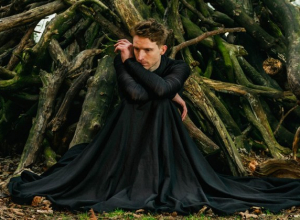How musicians have effectively made use of alternate revenue streams
By Toby King in Music / Festivals on 09 April 2020
There are many ways musicians are making money during this time.
The music industry is a fickle beast. One day you can be top of the pops, and the next you're yesterday's news. And that's just for those who are fortunate enough to make it to the top. There are thousands of musicians who work day in and day out at their craft, and never release a single album or play a gig. Because the reality is that no one can make a living from record sales alone; even the big names need to look into alternative revenue streams to supplement their income.

The revenue that bands and musicians generate is split into two main categories: irregular, one-off income and regular, reliable income. While most jobs pay a regular salary, this isn't so for musicians, so they mostly have to rely on a combination of irregular payments. Even royalties and album sales fall into this category, as they are inconsistent and experience peaks and troughs relative to the release of new music. These are supplemented with income from live performances, including ticket and merchandise sales. But for these to be enough to provide an income that will last for the rest of the year, you will need a substantial following, enough to fill out multiple venues on a tour, and it takes musicians a long time to establish a fan base big enough.
Early Career Supplements
While waiting for that big break, many musicians are able to peddle their talent in a variety of ways. Private music lessons can be a lucrative way to spend the day, allowing you freedom in the evenings for gigging, but that isn't the only way to provide a musical education. Posting tutorials on YouTube can earn you advertising revenue as well as helping to build your social media presence, something which is invaluable when building a name for yourself. Or put them on your own site and charge people to download them. You can do the same with ebooks.
Alternatively, selling your talents to other musicians can be a great way to gain exposure and experience, either by being a session musician or background performer. Many famous musicians started out this way, including the great Willie Nelson. While famous musicians might feel they are above touting their services as session musicians, there are plenty of opportunities for collaboration. Some may write songs for other artists - prolific songwriter Ed Sheeran has also penned huge hits for the likes of One Direction and Justin Bieber - or remix and rework tracks with them. There are many successful songwriters who never perform their own tracks, instead making money from the performers they sell them to.
Famous Alternate Incomes
But it isn't just musicians at the start of their career who are looking for alternative ways to make money. With musicians now able to trade on their celebrity as well as their skills with an instrument, there are far more avenues open for exploration. Singers and musicians can find other ways to stay in the public eye long after they have finished releasing records. This is most often through television appearances and sponsorship deals. Guns'N'Roses even licensed a slot game, which has proven to be a great way to make money without having to put in the extra work. Other weird and wonderful celebrity merchandise includes Mötorhead's wine and Kiss's coffins - yes really!
As well as licensing images, many musicians find that licensing their music produces a more reliable income stream than relying on purchase and airplay revenue alone. While there are some artists who are famously selective about licensing their popular music - including Abba and AC/DC - others seem to pop up in every movie, tv show and advertisement. But the most lucrative deals are not one-time plays; The Who managed to swing the ultimate licensing deal when there music was used as the theme tunes for all three CSI television series. Not only did this bring their hits to a new generation of fans, but the memorable themes became instantly recognisable and helped to propel the shows to fame, bringing even more money for the band.
But for some, making money behind the scenes isn't enough; they want the chance to perform and be known not just for their music, but for their personality. That's why so many musicians jump at the chance to appear on tv shows like The X Factor and The Voice. Musicians from a diverse range of backgrounds have appeared as coaches on The Voice; including will.i.am, Olly Murs, Paloma Faith and the legendary Tom Jones. They get paid for sharing their experience, mentoring new hopefuls and still get to promote their own brand and music. It's a win-win situation for everyone. With reality shows like these on the air in dozens of countries, it is a chance for local musicians to trade on their fame, but also for international artists to try and raise their profile abroad.
Alternative Revenue Streams
There are many different ways to earn money as a musician, without having to rely on album sales and tour tickets. You might be surprised what skills you have to offer and the different ways in which they can be used within the music industry. Remember, playing original music is not the best, or most praiseworthy, way to make it big, and many of today's successful musicians grafted their way to the top through giving music lessons, audio mixing and selling their songs to others. Even better, they're still doing it now they're famous.
Contactmusic
Suggested

Leisure Festival - Dreamland in Margate
On the same day that Glastonbury welcomed back Margate's adopted sons, The Libertines, Margate itself put on it's very own Leisure Festival as it...

Pretty Fierce talk to us about collaborating with Doja Cat, emetophobia, arena tours and staying "true to yourself" [EXCLUSIVE]
Sheffield's very own all girl group Pretty Fierce are still on a high after the recent release of their debut single - 'Ready For Me'.

Will Varley & Jack Valero - The Astor Theatre Deal Live Review
Three nights before the end of his current tour Will Varley returned to his home town of Deal to delight a sold out crowd in The Astor Theatre.

WYSE talks to us about her "form of synaesthesia", collaborating with Radiohead's Thom York and the prospect of touring with a band [EXCLUSIVE]
With only a few days to go before Portsmouth based songstress and producer WYSE releases her new single, 'Belladonna', we caught up with her to find...
Advertisement

Bay Bryan talks to us about being a "wee queer ginger", singing with Laura Marling and being inspired by Matilda [EXCLUSIVE]
Colorado raised, Glasgow educated and Manchester based Bay Bryan is nothing if not a multi-talented, multi-faceted artist performing as both...

Keelan X talks to us about staying true to "your creative vision", collaborating with Giorgio Moroder and being "a yoga nut" [EXCLUSIVE]
Former Marigolds band member Keelan Cunningham has rediscovered his love of music with his new solo project Keelan X.
![Luke De-Sciscio talks to us about having the courage to be yourself, forgiving that which is outside of one's control and following whims [EXCLUSIVE] Luke De-Sciscio talks to us about having the courage to be yourself, forgiving that which is outside of one's control and following whims [EXCLUSIVE]](https://images.contactmusic.com/images/home/homepage/luke-de-sciscio-abof-a.jpg)
Luke De-Sciscio talks to us about having the courage to be yourself, forgiving that which is outside of one's control and following whims [EXCLUSIVE]
Wiltshire singer-songwriter Luke De Sciscio, formally known as Folk Boy, is set to release is latest album - 'The Banquet' via AntiFragile Music on...

Annie Elise talks to us about the challenges a female producer has to face and "going through a year of grief and sickness" [EXCLUSIVE]
Electronic music pioneer and producer Annie Elise says that the release of her first EP - 'Breathe In, Breathe Out' feels "both vulnerable and...
Advertisement
